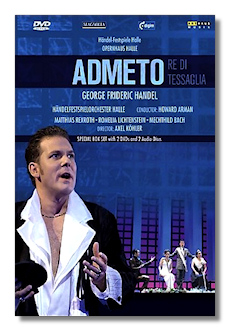
The Internet's Premier Classical Music Source
Related Links
- Handel Reviews
- Latest Reviews
- More Reviews
-
By Composer
-
Collections
DVD & Blu-ray
Books
Concert Reviews
Articles/Interviews
Software
Audio
Search Amazon
Recommended Links
Site News
 DVD Review
DVD Review
George Frideric Handel

Admeto, Re di Tessaglia
- Matthias Rexroth (Admeto)
- Romelia Lichtenstein (Alceste)
- Mechthild Bach (Antigona)
- Tim Mead (Trasimede)
- Raimund Nolte (Ercole)
- Melanie Hirsch (Orindo)
- Gerd Vogel (Meraspe)
Händelfestspielorchester Hallé/Howard Arman
Arthaus Musik 101257 2DVDs 196min Anamorphic Widescreen LPCM Stereo DD DTS plus 2CDs 43:19, 70:45
The Germans must still be angry that Handel spent most of his career in Italy and England. That's my theory, anyway, based on the number of truly outrageous Handel opera productions that come from Germany. This one, presented at the 2006 Handel Festival in Hallé, opens with Admeto, the king of ancient Thessaly, gravely ill. We know this, because he is lying in a modern hospital bed, attended by doctors in surgical gowns and masks, and with his CAT scans projected on the back wall! Alceste, his wife, later self-administers a lethal injection, exchanging her life for his. Still later, Trasimede, Admeto's brother, and Orindo, a courtier, take turns trying to rape the chloroformed Antigona on the same hospital bed. (Don't worry: by then, Admeto has recovered and gone elsewhere.) All this is courtesy of stage director Axel Köhler – himself also a countertenor. At the same time, the singers have been coached in extravagant "Baroque gestures" by Nils Niemann. To be honest, I often find revisionist Baroque productions entertaining, and at least Köhler's makes sense (in a weird way), and is reasonably faithful to the libretto. The cast performs it gamely, and one can't complain that this is a boring evening in the theater (or in front of the television).
The plot is your typical Baroque nonsense, albeit derived from Euripedes, so one could argue that Köhler was just making the best of a bad situation. Admeto will die unless a loved one gives her life for him. This his wife Alceste does readily, so the distraught Admeto sends Hercules (Ercole) down to Hades to bring her back. In the meantime, Antigona of Troy comes to Thessaly. She was to have married Admeto, but instead Admeto sent his soldiers to Troy and destroyed the city, so naturally she is curious to learn what happened. We find out that Trasimede, who wants Antigona for himself, substituted a portrait of an ugly woman for a portrait of Antigona that was to have been given to Admeto, and that is why he waged war on Troy. Now Alceste (believed dead, but brought back in disguise) and Antigona (also in disguise) are in Thessaly, and both competing for Admeto, who appears to prefer Antigona. The intrigues mount, but a happy ending (for most, but not all) is achieved when Antigona selflessly gives up her claim on Admeto, and the king and queen are reunited. When this opera was premièred in 1727, Alceste and Antigona were played by rivals Faustina Bordoni and Francesca Cuzzoni. Admeto was played by the famed castrato Senesino. I wonder if London audiences thought it odd to watch two sopranos fighting over a eunuch?
The singing ranges from better than passable to excellent in this production. No one alive today knows what Bordoni and Cuzzoni sounded like, of course, but it is probable that they were more electrifying performers than Lichtenstein and Bechthild. Still, Lichtenstein sings with security and style, and she catches fire (not literally!) in her big Act Three aria, so there's no cause for complaint here. Bechthild's lighter, brighter voice provides contrast, and she also does some sexy singing in the last act. Among the men, the best singing comes from English countertenor Tim Mead, who is made to play the evil nerd by Köhler! His voice has a nice, not unnatural sound, and he is strong in Handel's coloratura. The Ercole, Raimund Nolte, is good too. Matthias Rexroth's Admeto doesn't always project as strongly as he should, and his tone can hollow out unattractively. Hirsch sings well and looks cute, but Handel doesn't give Orindo much to do, and in this production, he gets kicked around by several of the characters. Vogel is an unexceptional Meraspe. Conductor Howard Arman and his ensemble of authentic instruments get the job done with character and attention to period detail.
This ungainly package contains two DVDs, two CDs, and a booklet. The DVDs contain the complete opera, as staged. The CDs contain an abridged version (minus recitatives, mostly) of what sounds like the same performance(s), and the booklet contains a plot summary, an essay, and cast biographies. However, the booklet omits a track listing of any sort. This is not a big problem for the DVDs, because tracks can be selected from the menu, but good luck finding a particular aria or scene on the CDs. The sound, in all three formats, is excellent, although there are many stage noises, some of the effects (for example, Antigona's truck(!) in Act Two) are deafening, and sometimes a singer's sonic perspective changes distractingly when he or she moves around the stage. The widescreen image is very fine, and the English subtitles are free, at least, of embarrassing updatings.
Copyright © 2007, Raymond Tuttle




















